The History of Augusta is the History of Wisconsin. 1874
Augusta Wisconsin History - In Early the Days
Written in 1874 and Republished in an Augusta Newspaper in 1907
Augusta Wisconsin - Seemingly Unchanged by Time
[ Back to the main History Page ]
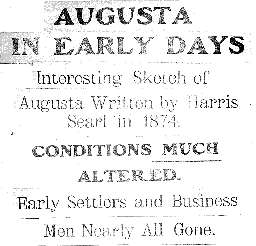 |
Augusta Wisconsin History 1874
|
| The article headline, March 26, 1907, Augusta Eagle Newspaper | Written in 1874 by Harris Searl From an article series published in the Augusta Eagle Newspaper, beginning March 27 1907, Transcribed from Wisconsin Historical Society archives |
Augusta Wisconsin In 1874 The Early Days - back to index
| Andrew Thompson, the
first white settler in the Town of Bridge Creek, came into this
country during the year 1855, Messrs. C. L. Chadbourn, E. S
Bills, Charles Buckman, John S. Stone and perhaps one or two
others came in with their families. There were the first
families in Bridge Creek – Mr. Thompson was a bachelor son of
Great Briton. In 1856 Messrs. Buckman, Stone and Bills located
on land near the village limits of Augusta which was platted in
September A. D 1857. Messrs. Buckman and Bills turned their attention to farming, while John F. Stone commenced building the first saw mill in the Chippewa valley, completing it during the winter of 1856-1857. William Maues came in and built a dwelling and store. This was the first frame store or dwelling in the town. |
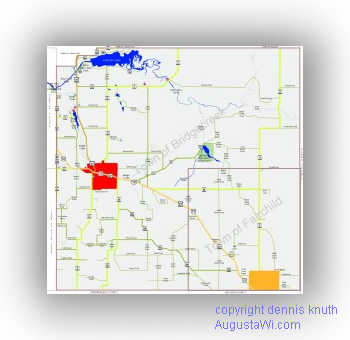 [You
can see the location of Thompson Valley, Wisconsin on the
Bridgecreek Township, in Eau Claire County
Wisconsin] [You
can see the location of Thompson Valley, Wisconsin on the
Bridgecreek Township, in Eau Claire County
Wisconsin] |
In the spring of 1859, H. Searl & Brothers with families arrived. They bought an undivided interest in the mill property of John F. Stone, and during the season built the first flouring mill in the valley, which is still standing and doing good work. During these three years some seven or eight families had settled in or near the village. The first hotel was built in 1862-1863 by Messrs. Buckman and Ball and is still standing and doing good service under its original name, “the Augusta House”.
Since the first plat was laid out, there have been five additions to the original plat, viz: Buckman’s first addition, May A. D 1867, Bills’ addition, June, A. D. 1867; Beckman’s second addition; Sept., A. D. 1868; John F. Stone’s addition May, A. D. 1867 and in April, A. D. 1870, the plat of Germantown was laid out, it being entirely detached from any part of the original village plat. However, it was destined to be one of the family of additions in due time. By an enactment of the legislature in the year 1857 Augusta was compelled to take the several additions under her parental care, though an act of incorporation, including the little hamlet of Germantown. And as far as heard from the family is doing well.
From 1860 until 1865, during the fearful war [American Civil War], the town made slow progress. But in 1866, the prospects of a railroad caused the outside world to turn its attention towards our valley; and, in the space of four years, a flourishing business grew up, during which time the West Wisconsin Railroad was completed in Augusta; running as it does through the village was advanced the growth and prosperity of the latter. Since 1866, the village has been steadily growing with the business of the surrounding country; and at present it has become a place of no small importance
Businesses Augusta Wisconsin in 1874 - back to index
I give a list of the principal business men and their occupations, who at the present time are permanently located in the village: P. Brown & Co, Hardware; T. W. Richards groceries and provisions; John O’Brian, meat market; Loomis Gallet & Breese dry goods, groceries and notions; W. H. Waterbury, groceries, notions and crockery; Davis Jackson, artist; Arthur C. White, meat market; Stone & Victory, drugs, medicines and grocers; G. W. Good now, furniture dealer; Warren Brothers, dry goods, groceries and notions; George P. Vaux, drugs, medicines and groceries; L. L. Williams & Co., books, stationery and jewelry; Vantyne & Beebe, boots, shoes and manufacturers; C. I. Chadbourn, hardware; Mrs. M. A. Hurst, dry goods and groceries; Mrs. A. W. Russell & Sons, dry goods and millenary; Charles Weiserbourn, groceries, crockery and liquors; Peter Heayet & Son, dry goods, grocers etc.; W. D. McClure, clothing and gents furnishing goods; Henry Fust, merchant tailor.
F. Dittmer & Son, boots, shoes and manufacturer; Mrs. Nichols millinery and restaurant; Silas Louckes, hotel keeper – the Augusta House; Hiram Blair, the Sheridan House Hotel; John Anderson, blacksmith; W. W. Norton, blacksmith; M. B. Rickard, blacksmith; W. H. Dickey, blacksmith; Joseph Zimmerman, barber; C. P. Niles, barber; Robert McGiven, harness maker; John F. Sicure & Son, manufacturer of flour and lumber; John L. Ball, manufacturer of sash door and blinds; A. Wilcox, gunsmith; N. E. Munger, livery stable; G. C. Hardy, saloon; H. A. Welch, saloon; A. Bartig, saloon; Fred Smith, saloon; Kasper, Nehr & Co, brewers; Searl & Russell, general land and insurance agents; H. R. Primley, dealer in agricultural implements, J. C. Backett, dealer in agricultural implements; John Burstdenler, dealer in agricultural implements; W. D. Hebard, dealer in agricultural implements.
Professional
D. C. Spencer, physician and surgeon regular; G. F. Hamilton, physician and surgeon regular; Henry Waidron, physician homeopathic; C. Woodford, physician homeopathic; R. D. Campbell, attorney at law and police justice; Ira B. Bradford, attorney at law; H. R. Day, attorney at law; H. L. Stiles, attorney and counselor.
Churches [in 1874 in Augusta Wisconsin ] - back to index
The First Baptist Church is a wood structure, 40 x 60 feet standing in a conspicuous place, finished in the most modern style and adds very much to the appearance of the village. Rev. C. C. Miller, the pastor is an able man, greatly beloved by the member and respected by the people generally.. It is by far the most popular Church organization in the village, having a very large membership.
The Methodist Church is a brick structure completed in ‘72 [1872] and though not situated in quite a conspicuous a place, it makes a grand appearance to the passers by and adds grandeur to the town. Rev. J. E. Irish, the pastor, is also an able man whose character is above reproach. The membership is not very large but regular services are held every Sabbath. The Congregational Church is a small cheap structure. The membership being small, and they have been able to purchase a lot (which is a very desirable place) and put this plain but comfortable house on it for the present. The pastor, with whom I have no acquaintances is also said to be a very popular man with his little flock.
The Universalists has no real organization. Although they have regular services in the little church “around the corner” (the Congregational Church) every two weeks. Their speaker is Mr. Cawrford [Crawford], a school teacher at the Village of Osseo, Trempealeau County. He has a reputation of being a very highly educated man and is much respected
Augusta Schools [Schools in Augusta Wisconsin] - back to index
In this department Augusta [Wisconsin Schools] has but few superiors (considering the population which will not exceed 1200 souls) and one thing makes it most praiseworthy, is that some time in 1867 or 1868, the inhabitants made up their minds that they could not condescend to have their children placed around in different localities with little houses as was then the case but they would join their strength and build a house large enough to accommodate all, so that the children of each family could go to the one and same place, even if they attend different departments. The citizens went to work with a will, that finally completed a $6,000 house, and had it supplied with the modern furniture. This of course brought a heavy taxation that was most impossible to pay
 [You can see the location of History of the Augusta Wisconsin High School, in 1906 Eau Claire County Wisconsin] |
However, it was paid in full, and they felt proud of the effort they had made, and completed so admirably. The building was supplied with the talented teachers and everything ran smoothly until 1872 when the firefiend took advantage of some builder’s negligence and destroyed the pet of the village. The shock was felt; most keenly; the progress of the publics had made only showed more plainly the great loss and the impossibility of doing without another even larger and better house [school house]. In 1872 the citizens again put their shoulder to the wheel and during that summer built another larger and better house [school house] than the one destroyed, at a cost of $7,000. The last one is build after the most modern style of architecture and is supplied with the very best improvements of the day. The heating apparatus, an invention of John L. Ball, the master builder, is a perfect success. |
The building was completed in season of the fall term of 1873 and supplied with the very best teachers that could be found: Thomas Williams, Esq., the principal, a young man who is one of nature’s noblement, and whose very life and souls is in his work, has taken charge of the training and the culture of the coming men and women, backed by the most amiable young ladies, who also have had large experience in the department of education. This description alone speaks for the intelligence, moral worth and high standing of at least a majority of the citizens of Augusta [Wisconsin] when taking in the consideration the fearful taxation that attends the buildings, in so short a time of two such buildings, beside the amount required to keep the school running.
No stranger is afraid or asked to mingle in the society of such sterling work. The location is not in as sightly a place as might have been desired to show to the passing thousands on the trains who by a natural instinct often look, and judge the moral worth of the citizens of a place [Augusta Wisconsin] by its school house and church steeples. However, the site is one whole block, set out to shade trees, with a beautiful lawn, neatly fenced in, with walks running from the two front corners to either entrances of the building. Long may the citizens of Augusta [Wisconsin] feel proud of this in accomplishing so good a work under such unfavorable circumstances.
Continued on March 29. 1907 in the Augusta Eagle Newspaper
The [1874 Wisconsin] Market and Other Advantages - back to index
The market being one of the principal causes of success in the all important branches of business life, and one upon which the welfare of every city and town depends for its support and thrift, I shall speak full concerning this branch of our history. In the first place, the location is such that Augusta has superior advantages over any other town on the road. The lumber interest is one of great importance, it being located “central’
| For the Eau Claire and upper Black River pineries – having, as it were a large forest to the north and east and on the south and west the best farming valleys to be found in the west. The pinery interest requires may thousand dollars worth of all kinds of course grains and cereals, that in most other locality cannot be disposed of only at small profits over the actual cost of raised them. At Augusta, like any other lumber town, every pound of pork, beef, (of which large amounts are shipped from Milwaukee and Chicago) and every bushel of potatoes, onions, beans, oats, corn, turnips and every ton of hay or straw that can be raised, are sold at higher prices and more rapidly than at most any other place in the country, except at some places similarly situated |
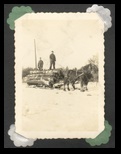 [You can see a 1940's photo of a typical 1874 logging sled and horse team on the Augusta Wisconsin Knuth Site] |
On the other had, it has the benefit of one of the best wheat markets on the line of the whole road, situated as it is, nearly in the center of one of the richest, and best wheat growing districts in the State. For an illustration, six years ago the wheat raised in this neighborhood was all hauled by teams to Sparta [Wisconsin] costing from forty to fifty cents a bushel to market it; and about three years ago, after the railroad was completed, two warehouses could do all the shipping necessary. Now there are four, one of those an elevator, and such is the increase and demand, that parties are now erecting another elevator to do the business of the present time. A person can readily see the vast improvement that is to still be made in the agricultural interests of the neighborhood, and the vast improvements in all branches of business in our little burg.
The report of the grain shipped from the depot during the last seven months is of wheat 160,000 bushels. Now bear in mind that westward but 10 cities there is another shipping market and at the east, eleven miles distant, another, each doing a good business; and that in 1858, the most of these beautiful valleys were hunting grounds for the red men [Wisconsin Indians] where the elk, dear, bear and other game roam at will. I might mention hundreds of men who in this short space of time, have obtained beautiful farms and buildings and everything that it has taken a life-time to accomplish in other states to make life pleasant, and all this wealth has been accumulated by our having the best soil, steady, industrious men and woman, and good markets of which Augusta [Wisconsin] is the grand center.
It is situated in a beautiful valley, level, handsome and healthy, with sufficient water power for manufacturing, and plenty of time to manufacture, and, what is more a prairies farming country, with and abundance of wood for all purposes.
It may be proper to mention here, in connections with what was already been said, that there are from one and a half to two millions of feet of pine lumber manufactured within the village annually; that there are two other very fine mills manufacturing lumber within six miles of us; that the whole of said lumber is either shipped at this place, or passes though the village to the farmers for building purposes; and that not six miles distant there are many millions of feet of lumber still growing; to be manufactured in the future.
Nationality of the Valley of Augusta Wisconsin - back to index
The first settlers [in Augusta Wisconsin] were New York and New England people, with an occasional foreigner, who at that early day had to migrate over new and almost unsettled country on a long journey in their covered wagons, stopping when night overtook them, by some spring by the mountain side or some babbling brook that would afford water for themselves and their cattle and horses, being weeks or even months on their journey. They were with a few exceptions very poor, bringing with them barely enough to feed and clothe themselves until the first cabin could be build and the first crop gathered in.
Industry and economy have repaid most of those old pioneers with beautiful homes, and surrounding them with nearly all the comforts and luxuries of the east. They were possessed with the determination that others had thus procured homes before them and what others could do, they could and would do also; and they did do as this narrative will show before completed.
One example might illustrate the many hardships that were endured by the first to enter up this beautiful country. One, whose name I will not mention, came from Maine to seek a home in the then far west upon striking this country, made himself a claim in the shape of a preemption, and commenced improvements with nothing but his hands with which to labor. Every furrow broken had to be worked, he giving hand labor to some neighbor that would exchange with him. After the land was broken, it became necessary to build a fence, and nails had to be got without team or wagon. Well, what did he do but start on foot to what is now the commercial center of Eau Claire County, and there he bought a keg of nails and packed them home, a distance of 18 miles, making 36 miles of traveling in the same day.
Who is there coming now-a-days that will be able to do this? Who has got the determination to win or die? Very few. I desire to follow this circumstance a little farther to show what has been done. Another trial came a hundred and sixty acres of land had to be paid for within a certain time. Well, could it be done? Only one way there was, and that this: “My old father,” thought he, “is in the east, and he can by scraping together the earnings of a life time help me out and I will take care that he has a home in his old age”. The message was sent back to his early home, and shortly after the much needed money was received, the land paid for, taking, perhaps, the old State-of- Mainer had accumulated through earlier life, thereby securing a home for both the father and son. We will pass a few years and take another look at this western farm and family today.
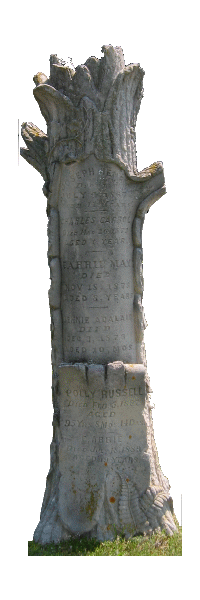 A Tree Truck Headstone in the East Lawn Cemetary in Augusta Wisconsin. You can see it Full Size |
Who is there coming now-a-days that will be able to do this? Who has got the determination to win or die? Very few. I desire to follow this circumstance a little farther to show what has been done. Another trial came a hundred and sixty acres of land had to be paid for within a certain time. Well, could it be done? Only one way there was, and that this: “My old father,” thought he, “is in the east, and he can by scraping together the earnings of a life time help me out and I will take care that he has a home in his old age”. The message was sent back to his early home, and shortly after the much needed money was received, the land paid for, taking, perhaps, the old State-of- Mainer had accumulated through earlier life, thereby securing a home for both the father and son. We will pass a few years and take another look at this western farm and family today. By calling at a splendid white houses, surrounded by fruit trees, barns and necessary out-houses, nine miles from Augusta, you will find the same father and son, and the son’s wife and family, enjoying health, wealth and the luxuries to be found in the west. He has all the wealth necessary to make him comfortable and happy and is carrying out that pledge to the gray headed father, to the perfect satisfaction of all concerned. The above is only an illustration of the trials and achievements of those who came in those early times. All had there trials and hardships; none escaped. |
In later years, Norway, Sweden, German, France, England, Scotland and nearly all nationalities have contributed to help increase the population and the improvements of our valley and county, these people being in the county majority, and through our valleys – about half the population at the present time.
Another thing presents itself to the stranger in silent and unmistaken language and in the praise of the community: it is the neatness of the school house, churches, public buildings and cemeteries for the dead.
When a person of observation passes a well fenced grave yard and nicely arranged monuments, shrubbery, shade trees, etc., he is instantly impressed with a feeling of gratitude towards the inhabitants of that place. It is to the stranger a guarantee for the industry, intelligence and thrift; a strong symptom of a high order of humanity. I will wager that Augusta, as a village and Eau Claire county, as a county, will compare favorably with any town and county in the state in this respect.
Look at our pauper list and those of the surrounding towns and compare them with any other portion of the state. You will find ours a mere trifle, if anything. All these things carry weights of argument in favor of the industry, health and morality of the people in such communities. Poverty, idleness and bigotry are of one family, and inseparable. Many thanks to the power that emanates from the thousands of school houses in Wisconsin!
| A brief notice of
some of the valleys that by their natural location are connected
with our village interests, may not come amiss in this
connections, nor a sketch of some of the early settlers thereof.
Space forbids me giving a full detail of the farming interests
thereof. I will commence with one of my friends, who for short
is commonly called Hank Brown, living in Thompson’s Valley, and
who came to the country, poor in point of cash, but rich with
health, muscles, and brains, (which constitutes the man)
hospitable and kind and energetic. He succeeded in getting a quarter section of land on time payments and it may be stated right here that there is not a better quarter section of land in Wisconsin. Well, Hank’s good judgment told him that to succeed there must be a rib about the plantation and being in favor of getting one of old father Adam’s kind, that would produce a fall, nothing would answer to fill the bill but a choice of one of Joseph Strader’s girls. |
 A Knuth Family portrait - Immigrants in Augusta Wisconsin in the late 19th century. The portrait is one family of scores that settled in Wisconsin and Eau Claire County in Wisconsin |
The facts are, he got one; and if any person thinks the bill was not filled, and that something better than one of Adam’s kind of women too, just let him call on Mr. and Mrs. Henry Brown; if they do not satisfy him that perfect order, system and comfort dwell in and around the plantation I am no judge. Buildings, fruit trees, fences, improvements and everything, denote order, industry, and economy.
He is independent, loves his friends and lets his enemies alone. Henry is not the only one of his stamp of the successful farmers in this beautiful valley. We will take a look at our noble friend, James Asplin whose right arm was pounded out on the anvil one of the best farms in the valley, and he has just good sense enough to live on it and enjoy the fruits of his hard earned toll. I can also mention Benj[amin] F. Pride, Joseph Strader with his magnificent brick house, Fletcher Dighton, S. E. Cooledge, I. G. Bills, William Arries, James Surgeon, Lindsey Wright, F. A. and S. H. Denison. Peter O’Blair, and scores more, all model men, now well-to-do, though they were all poor but a few years ago when they came to the valley. Nothing short of good markets, health, good habits and rich soil can produce such results in so short a time. This is a truthful picture of this beautiful valley, and it is by such men that we are surrounded, as neighbors and friends; intelligence and true friendship are embodied in such a class of men.
article continued in the Augusta Eagle on April 5, 1907 – continued from previous week - back to index
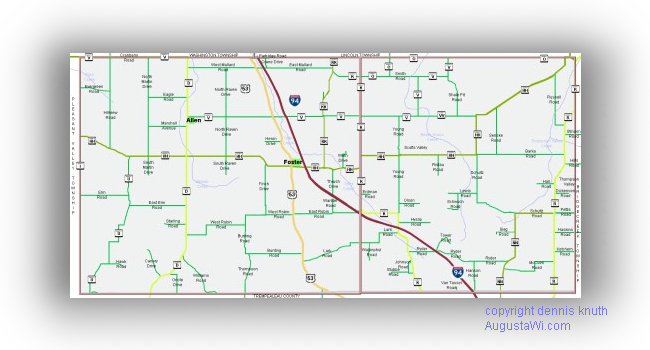
Otter Creek and Clear Creek Map
One might think that if I stopped here that it would embrace all the allied worth of Augusta and Bridge Creek Valley. Not so by a considerable. Go with me to Scott’s Valley, once a part of Bridge Creek. Who ever passed through this part of the state without hearing of this noted place? Noted particularly as the most fertile and richest valley west of the Wisconsin River, and known now as a part of Otter Creek. It was named after the pioneer of the valley, Robert E. Scott, son of Scotland, who was the first settler. He also has a model farm, and everything is model about him. He has one of the best dwellings in the country, with barns and other building – all in perfect order.
Everything is done at the right time and in the right way. All this has been accomplished within a few years by himself and most amable [amiable] wife, who I am sorry to say, does not take that pleasure of her hard earnings that she would were she in better health. But she is truly “humanity’s friend”. The lives of such men and women cannot be prescribed to three score years and ten, for their kind acts and good characters are remembered by all good men and women to all future time.
To pass this portion of this narrative without making any mention of Bridge Creek, or its farming interests, would be of great injustice as it comprises a class of industrious men and women that have made their mark and done their full share of the toil and hardship consequent to the new country, some of whom have made themselves quite independent, a portion of the valley runs south and east of the village, a distance of six miles, and nearly the whole way are good improved farms on either part of the road. Although the soil is not as deep and fertile as in the valleys before described, it will compare favorable with a majority of the farms throughout the country. West and northwest of our village will be found some very elegant locations, well improved, with good finished buildings and other conveniences for a distance of from three to five miles, joining on to the town of Lincoln. Lincoln is a well settled town particularly the south-eastern portion of it, which joins us and whose interest is allied with ours as much as any part of our own town, since its inhabitants find their market in Augusta.
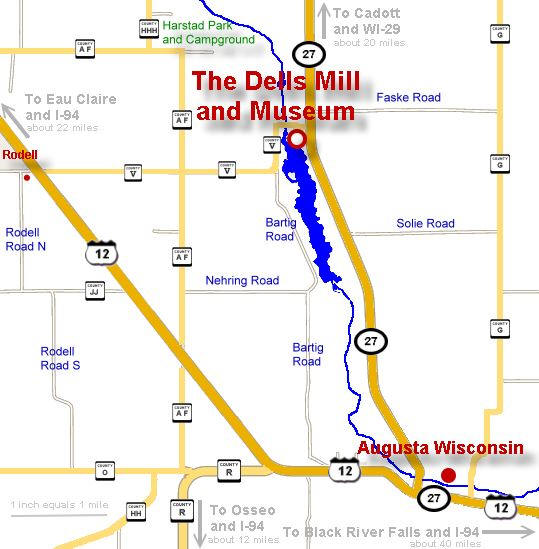 Local Map to the Dells Mill |
At the Dells, three miles down the valley from the village, is perhaps one of the most perfect water powers to be found in the country, with twenty-three feet head, a merchant four mill, which cost about twenty-one thousand dollars. A school house, several dwellings, a store, and a blacksmith shop at this point, make quite a show toward a village |
Political and Social Relations [in Augusta Wis, 1874] - back to index
The character of our religious denominations having been given, perhaps our political and social relations may not come amiss in this connection. Up to 1861, the local advantages were about all our citizens took any special interest in. but when the news came that Sumpter [Fort Sumter in the American Civil War] had been fired upon, the people of the this valley, in common with those of the surrounding country, felt the insult as though it had been specially aimed at them and from the first three months until the final surrender the valley had its full show of representatives in the deadly strife [of the American Civil War]. During all those years of weeping and mourning, we had in the Union army a large list of our best citizens, many of who never returned to their families and friends. Some of them do not even share the honor of our decoration day, but are buried in the shade of the Rocky Mountains or in the sunny south, where their dearest friends may never find their graves. During the four years of mortal combat, the little town of Bridge Creek raised and paid towards town and county bounties of families and volunteers over $9,000. It [Augusta Wisconsin] was at this time seven-eights Republican, and this party still holds the majority.
At the present time, however, the [Republican] majority, has been reduced in proportion to the importation of the foreign element coming in, which seems to be attracted to the opposite, more on the account of the name “Democracy” [the Democratic party], than the principles involved. It cannot be denied that the Germans and Norwegians as well as most other foreign born people became warmly attached to the principles of our constitution and laws, and make citizens worthy of the highest respect of every American. It is remarkable fact that this class of citizens are mostly laboring men and women and tillers of the soil.
Go where you will, into any city and village where there are large numbers of idle person lounging around, apparently out of all kinds of business and you will seldom find the Germans and Norwegians in their midst. As American we may well feel proud of the foreign element, that will in the future intermingle and improve the stock of our speculative, dyspeptic American nation.
Kings Oscar [of Sweden-Norway] and [King] Wilhelm [of Germany] may continue to let their subjects come over to us, as we seldom find a pauper among them, which is more than we can say of some other nationalities. Although many are poor, which is no disgrace, they are honest and industrious.
Of Secret Organizations [in Augusta Wisconsin - back to index
| We have four in the village: Masonic, Odd Fellows, Sons of Temperance and Grangers. The last but not the least, is made up of the very best men and women in the country, who are in the country, who are in earnest in their demands for a true reform. These organizations have each a fair membership, and their lodge rooms at regular stated meetings are well attended. They are doing their special work for the good of the great family of mankind. The time is fast approaching when the bigoted notions that have prevailed in the minds of the masses will die out, and they, like the church organizations, will be considered important in carrying out of their part of the good work in the great and national reforms. It does not require a very close observation to see that each and all of the different are particularly adapted to the different demands of the society, and that each is doing its good work in its own particular way. |
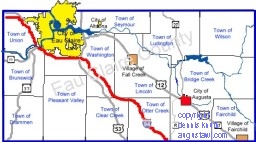 Eau Claire County Map |
Let such organizations go on, so long as they visit the sick, bury the dead, support and educate the orphan, protect the widows, and try to improve the condition of the laboring millions. I say “Go on, complete your missions, whether we know your secret passwords and grips or not. Carry out the object of your several orders, and should you not come up to that standpoint which you are aiming at, we will or ought to give you credit for all the good you do accomplish. It is not the publication of charitable acts that reaches of widow’s heart.” There is also a Liberal League*(see note below) organized in Augusta with a respectable membership, the object of which is a full and free discussion of any and all subjects that interests the people, political, religious, moral, spiritual or scientific. Speakers and lecturers are requested to correspond with the League
[Signed] Harris Searl [published in the Augusta Wisconsin Eagle newspaper, beginning in March 1907 - back to index ]
[ Back to the main History Page ]
________________________________________________________
This transcription is copyright 2006 by Prorganize tm. Use of this information must cite this source, Augustawi.com, including the copyright and this web site
________________________________________________________
*During the late 1800's, there was also a "National Liberal League" that was interested in the separation of Church and State, black emancipation, women's rights, personal rights, civil liberties and freedom of thought. A link defining the "National Liberal League" was not found. However, this link to a letter written in 1878 may give you ideas about the "National Liberal League"

